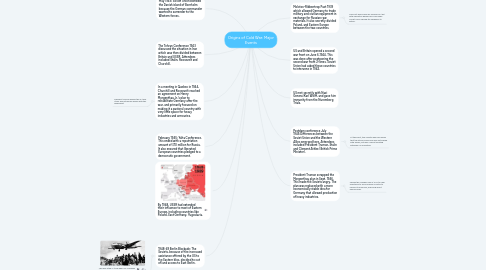Origins of Cold War: Major Events
作者:Arti Nair

1. May 1945: Soviet Union bombed the Danish island of Bornholm because the German commander wanted to surrender to the Western forces.
2. The Tehran Conference 1943 discussed the situation in Iran which was then divided between Britain and USSR. Attendees included Stalin, Roosevelt and Churchill.
3. In a meeting in Quebec in 1944, Churchill and Roosevelt reached an agreement on Henry Morgenthau Jr.'s plan to rehabilitate Germany after the war, and primarily focused on making it a pastoral country with very little space for heavy industries and armouries.
3.1. President Truman signed this in 1945. Stalin was extremely please with this agreement.
4. February 1945: Yalta Conference. This ended with a repatriation amount of $10 million for Russia. It also ensured that liberated European countries pledged to a democratic government.
5. By 1948, USSR had extended their influence to most of Eastern Europe, including countries like Poland, East Germany, Yugoslavia.
6. 1948-49 Berlin Blockade: The Soviets, because of the increased assistance offered by the US to the Eastern bloc, decided to cut of land access to East Berlin.
6.1. This was lifted in 1949 when US managed to run an aerial supply campaign.
7. Molotov-Ribbentrop Pact 1939 which allowed Germany to trade military and civilian equipment in exchange for Russian raw materials. It also secretly divided Poland, and Eastern Europe between the two countries.
7.1. This Pact was broken by Germany in 1941 with Operation Barbarossa. This made Soviet Union change its allegiance to Britain.
8. US and Britain opened a second war front on June 6,1944. This was done after postponing the second war front 2 times. Soviet Union had asked these countries to intervene in 1942.
9. US met secretly with Nazi General Karl Wolff, and gave him immunity from the Nuremberg Trials.
10. Postdam conference July 1945:Differences between the Soviet Union and the Western Allies emerged here. Attendees included President Truman, Stalin and Clement Attlee (British Prime Minister).
10.1. At this point, the Soviets were also angry that the atomic bomb plan was not shared with Russia, but was a secret meeting between US and Britain.
11. President Truman scrapped the Morgenthau plan in Sept. 1946. This made the Soviets angry. The plan was replaced with a more economically stable idea for Germany that allowed production of heavy industries.
11.1. Passed the Marshall Plan in 1947 to offer assistance to any European country to rebuild its economy, and bring about democracies.


